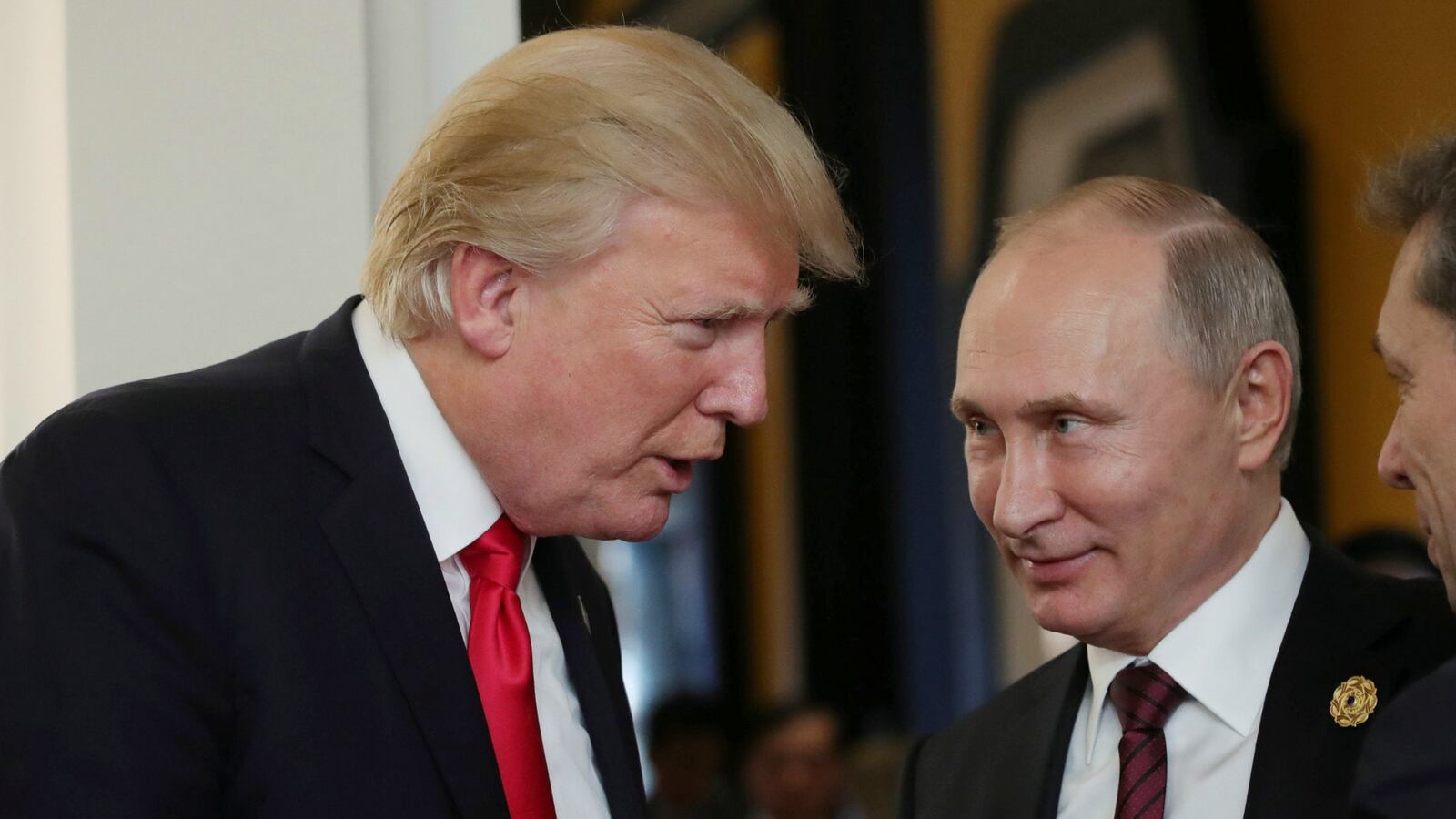The U.S. has issued a sweeping new set of Russia sanctions on seven high-profile Russian oligarchs and the 12 companies they control, including a Russian long rumored to be Vladimir Putin’s son-in-law and a notorious aluminum magnate closely linked to Paul Manafort, Donald Trump’s former campaign manager.
The sanctions package freezes U.S. assets of the named oligarchs as well as 17 Russian officials, in the latest punishment for “malign activity,” including the Kremlin’s meddling in the 2016 presidential election. It also names Kirill Shamalov, who in 2013 married Katerina Tikhonova, a woman said to be the Russian president’s daughter; Oleg Deripaska, an industrialist who bank records have shown Manafort owed millions to and was said to be offered secret briefings on the Trump campaign; and Suleiman Kerimov, who allegedly smuggled millions of euros into France in suitcases.
Also targeted: Alexander Torshin, deputy governor of the Central Bank of the Russian Federation, who was added to the list “for being an official of the Government of the Russian Federation.” Torshin was previously investigated by the FBI amid allegations he may have funneled money into Donald Trump’s presidential campaign through the National Rifle Association. Torshin met with Donald Trump Jr. at the gun-rights group’s convention in 2016. The Daily Beast reported on Torshin’s close links to Maria Butina, whose relationship with Paul Erickson, a decades-long Republican Party activist, has raised eyebrows in the investigation into Russia’s involvement in the 2016 election.
The punishment has also targeted 17 Russian officials working for either the government or state-owned companies, including Alexei Miller, chairman of Gazprom, and Andrei Kostin, head of state-owned bank VTB, which has been described as Putin’s personal piggy bank by international watchdogs.
The sanctions have not been brought in to retaliate for a specific act but in punishment for what U.S. officials called “the totality of the Russian government’s ongoing and increasingly brazen pattern.” The announcement comes a week after the U.S. expelled 60 Russian diplomats in the wake of the nerve-agent attack on a former spy in Britain.
“The Russian government operates for the disproportionate benefit of oligarchs and government elites,” said Treasury Secretary Steve Mnuchin in a statement. “The Russian government engages in a range of malign activity around the globe, including continuing to occupy Crimea and instigate violence in eastern Ukraine, supplying the Assad regime with material and weaponry as they bomb their own civilians, attempting to subvert Western democracies, and malicious cyberactivities.”
Mnuchin added: “Russian oligarchs and elites who profit from this corrupt system will no longer be insulated from the consequences of their government’s destabilizing activities.”
Under the sanctions, American citizens will be prohibited from dealing with the named individuals and businesses, and non-U.S. citizens could face penalties for carrying out business on behalf of any of the named Russians inside the country.
In a press release issued Friday morning, the Treasury Department listed the oligarchs, companies, and officials that have been hit by the new sanctions and explained why each had been added to the list.
For example, Shamalov married Putin’s daughter in February 2013 and the Treasury Department said “his fortunes drastically improved following the marriage; within 18 months, he acquired a large portion of shares of Sibur, a Russia-based company involved in oil and gas exploration, production, processing, and refining.”
Oleg Deripaska, who has numerous business links to Paul Manafort, and was described by Russia’s opposition leader as a link between the Trump campaign and the Kremlin, has been added to the list as he’s been “investigated for money laundering, and has been accused of threatening the lives of business rivals, illegally wiretapping a government official, and taking part in extortion and racketeering,” according to the document.
Russian lawmaker Konstantin Kosachev, chairman of the international affairs committee of Russia’s upper house of parliament, said the sanctions were “baseless and unfriendly,” according to Reuters.
Russia’s trade minister said state companies hit by the sanctions would be given more government support.






